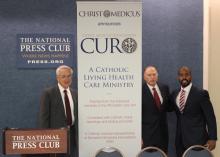Affordable Care Act

Of course Obamacare is failing.
Not quite as badly as No-Obamacare was failing, so I'm still glad it exists. It's a necessary stopgap until we find a system that actually works. But you know what? Single-payer healthcare will fail just as badly.
Yes, I know that single-payer healthcare systems succeed in other developed nations. I also know that competitive insurance-based healthcare systems succeed elsewhere. But neither system will succeed in the United States, because the U.S. is the only nation on earth that refuses to keep healthcare spending from spiraling out of control. If the cost remains the same, it doesn't matter who's paying. In the long run, we all are.

THIS SUMMER’S ATTEMPT to dismantle the Affordable Care Act began as the very height of frivolous lawsuits. Cooked up with the help of the Competitive Enterprise Institute, a libertarian think tank, the case (King v. Burwell) depended upon a very narrow reading of four words in Section 36B of the ACA: “established by the State.”
Essentially, Obamacare foes argued that Congress intended to provide health-care subsidies (or tax credits) only to those Americans living in states with state-operated insurance exchanges. Those who lived in states without exchanges—including Florida, Texas, Wisconsin, and others—and were, therefore, dependent upon the federal exchange would be ineligible for subsidies.
Of course, Congress intended no such thing—as the Supreme Court upheld. Throughout dozens of hearings and hundreds of hours of debate, it was clear that ACA subsidies would be available to every American, regardless of what state they lived in.
In a 6-3 ruling, the court rejected King, with Chief Justice Roberts explaining, “A fair reading of legislation demands a fair understanding of the legislative plan. Congress passed the Affordable Care Act to improve health insurance markets, not to destroy them.”
Had the suit carried the day, 6.4 million Americans would have lost their subsidies.

With some members of Congress and Health and Human Services Secretary Sylvia Burwell in the audience, Obama’s speech was entirely about the success of his signature legislation and the need to keep it alive.
Obama recited statistics on how many uninsured are now covered and on the economic value of “portable plans in a competitive marketplace.” But he anchored his speech in the faith-based association’s moral calling.
“What kind of country do we want to be?” he asked in a series of rhetorical questions:
Is access to care a commodity “only for the highest bidders?” Or is it “a fundamental right?”


THE AFFORDABLE CARE ACT, which has now been the law of the land for five years, is beginning to reshape the national landscape in significant ways.
According to a New York Times analysis of the ACA’s first enrollment period, about 10 million additional people gained insurance in 2014. Many of them fall into demographic groups that have historically struggled to access coverage, such as low-income Americans, people of color, and women. Ultimately, President Obama’s health law is slowly making the country more equal.
There are a few ways the ACA is accomplishing that goal. It has built-in consumer protections to ensure that insurance companies treat people more fairly. It’s created state-level marketplaces to give people new options for purchasing private plans. And it’s expanded the pool of people who are eligible for public coverage through the Medicaid program.
Health policy experts agree that adding more low-income people to the Medicaid rolls represents one of the biggest successes of the ACA so far. According to the Urban Institute, a nonprofit research group, the states that agreed to expand their Medicaid programs—27 so far, plus the District of Columbia—have seen about a 40 percent drop in their uninsured rates.

If you are a Christian who doesn’t smoke, abstains from sex outside your heterosexual marriage and can get your priest to vouch that you go to church at least three times a month, you may qualify for a new Catholic alternative to health insurance.
Taking a cue from evangelicals, a group of traditionalist Catholics on Oct. 2 unveiled a cost-sharing network that they say honors their values and ensures that they are not even indirectly supporting health care services such as abortion that contradict their beliefs.
Christ Medicus Foundation CURO, as the group is called, will be financially integrated with Samaritan Ministries International, which was launched in 1991 by an evangelical home-schooling dad. The SMI network now serves 125,000 people and is exempt from the Affordable Care Act.
“Think about the Gospels and how the Apostles lived,” said CMF CURO director Louis A. Brown Jr. at the program’s Washington, D.C., debut. “They very much shared and cared for each other. And we’re saying: ‘Catholics, you can do that too.’”

Five things to know about one of the most anticipated Supreme Court decisions of the year:
1. Corporations can’t pray, but they do have religious rights.
Hobby Lobby isn’t a person. It’s a chain of crafts stores owned by a religious family. And though the evangelical Green family objects to parts of the Affordable Care Act’s emergency contraception mandate, it’s not the Greens but the company that writes the check for employees’ health insurance. The first question the justices had to answer was this: Does Hobby Lobby have religious rights? To many Americans, this sounds a little nutty. Does a craft store believe in God?
A majority of the justices held that a closely held company such as Hobby Lobby does have religious rights. The court didn’t apply those rights, however, to publicly held corporations, where owners’ religious beliefs would be hard to discern.
But well before the justices had delivered their verdict on this question, many legal scholars said they wouldn’t be surprised were they to affirm the company’s religious rights. American corporations do have some of the rights and responsibilities we usually associate with people. And in the 2010Citizens United campaign finance case, the justices overturned bans on corporate political spending as a violation of freedom of speech — corporations’ free speech.

The Supreme Court on Monday sided with the evangelical owners of Hobby Lobby Stores Inc., ruling 5-4 that the arts-and-crafts chain does not have to offer insurance for types of birth control that conflict with company owners’ religious beliefs.
Beyond the specifics of the Hobby Lobby case before them, the justices broke new legal ground by affirming that corporations, not just individual Americans or religious non-profits, may claim religious rights.
Does Monday’s decision mean, however, that the religious beliefs of business owners stand paramount? That they are more important than a female employee’s right to choose from the full array of birth control methods she is promised under the Affordable Care Act? Or that a business owner may invoke his religious rights to deny service to a gay couple?
Not necessarily, legal experts say.

Closely held corporations cannot be compelled to pay for contraception coverage, the Supreme Court ruled Monday in its highly anticipated Burwell v. Hobby Lobby Stores case. The "contraceptive mandate" in the federal health care law was challenged under the Religious Freedom Restoration Act, which requires that the government show that a law doesn't "substantially burden" religious exercise.
According to SCOTUSBlog, the Court ruled that the government "has failed to show that the mandate is the least restrictive means of advancing its interest in guaranteeing cost-free access to birth control."
But the decision is applicable only to the contraceptive mandate, and does not apply to other health care mandates.
From Washington Post :
The justices’ 5-4 decision Monday is the first time that the high court has ruled that profit-seeking businesses can hold religious views under federal law. And it means the Obama administration must search for a different way of providing free contraception to women who are covered under objecting companies’ health insurance plans.
Hobby Lobby is an evangelical family-owned chain, and CEO David Green says that the Affordable Care Act infringed upon the family's religious freedom by compelling them to pay for certain contraceptives the family considers to be abortifacients, such as versions of the morning-after pill and IUDs.
Justices Ginsberg, Sotomayor, Breyer, and Kagan dissented.
Read the decision HERE.

I’ve recently been thinking a lot about failure.
Not my failures, though I suspect we could come up with a few.
No, I’ve thinking about Scott Walker’s failed governorship in Wisconsin.
And Barack Obama’s failed presidency in the nation.
And our failed foreign policy.
And the failed Affordable Care Act.
And Walker’s failed jobs policy for the Badger State. And so on.
Then I started thinking about the failure of our political dialogue these days.

On one Friday earlier this month, more than 11,000 Muslims in mosques across the country heard a sermon about the Affordable Care Act.
Jewish women’s groups have visited college campuses to get students who think they’re “invincible” to sign up for health insurance.
As the national March 31 deadline for health insurance enrollment looms and with President Obama’s encouragement, organizations across a range of faiths are working to sign up uninsured Americans for coverage under Obamacare.


SEVERAL YEARS AGO, before Congress passed the Affordable Care Act, many people were clear on the need to get health care for our brothers and sisters and joined in the push to reform the delivery system for health care in this country. When it was enacted, we were thrilled that those who had such difficulty getting even the most basic care for themselves and their children would finally have some health security.
But the notorious website problems—including the crashes, the inability to access it, the insurance programs that have been canceled, and the smaller-than-expected number of people who have been enrolled—have frustrated, discouraged and sometimes challenged us. This has been complicated by political bombast and in some cases, sadly, vicious character assassinations.
As people of faith, it is important not to be swept up in these problems, but to relentlessly pursue access to health care for the 48 million people who do not have health insurance today. We also need to remember that the ACA is more than a website. Think of the millions of young adults who can now stay on their parents’ insurance and the thousands of small businesses that have received tax credits for providing insurance to their employees.
The new rules that guarantee comprehensive insurance coverage, no barriers to preventive care, no pre-existing condition limits, and no lifetime limits on coverage have already made a huge difference in the lives of many families. The portion of the law that requires insurance companies to spend 80 to 85 percent of premium revenue on actual care rather than profits or dividends to shareholders will do much to make the cost of insurance more reasonable.

Conception. Pregnancy. Abortion. Abortifacient.
Those words today are in a rhetorical swamp where contesting religious, medical, and political views muddy understanding. And soon the U.S. Supreme Court will wade in.
On March 25, it will hear challenges to the Affordable Care Act’s provision that employers must provide insurance coverage with no co-pays for contraception.

Every time he goes to the doctor’s office, Daniel Eddinger takes a leap of faith.
Eddinger, a 28-year-old father of two from Lexington, N.C., doesn’t have health insurance.
But he’s not worried about the cost of getting sick.
Instead of insurance, he says, he relies on God — and the help of other believers — to pay his medical bills.

This morning at breakfast, I was reading an article in the newspaper about how the Affordable Care Act is negatively affecting some individuals — especially those who buy their own insurance, rather than receiving it through an employer. The article was interesting, but what struck me the most was the way the problem was framed. Rather than approaching the story from a public policy angle, the article mainly focused on the reaction of consumers of health-care goods and services. The crux of the article was whether some individuals should be required to buy a product they might not want or need so that other individuals could have affordable access to health-care products they need desperately but might not be able to afford under the old regime.
The dilemma was presented as a story of tension between healthier consumers and less healthy consumers fighting to get the best deal for their health-care dollars. But could there be another way of thinking about health care, and about our society as a whole? Is there a framework that would allow us to consider these questions in a way that assumed connection, caring, and community between individuals, rather than the zero-sum competition of the market?

Yes, President Obama said that if we like our health insurance, we can keep it.
Yes, that turned out to be false for a few million people.
Yes, the president chose his words poorly. Whether or not health reform became the law of the land, there’s no way any president could have known if we’d be able to keep our health insurance from one year to the next.

The theatrics around the Affordable Care Act seem only to be matched by the public’s ignorance about what it actually is. Case in point: when late-night talk show host Jimmy Kimmel sent a reporter out on the street to ask people their opinions, they felt markedly better about the nuts and bolts of the Affordable Care Act than they did about Obamacare.
Never mind they’re the same thing (sigh).
It seems that a handful of lawmakers have seen to it that our ignorance is sown into full-blown fear, obfuscating the fact that the shutdown – which was largely a fight over the ACA – cost our economy about $25 billion. For those who have been following even on a cursory level, the arguments against the ACA are becoming quite familiar:
· The individual mandate infringes on my freedom not to have insurance.
- The whole thing costs too much.
- It’s a slippery slope to a single-payer system.
On this last point, we can only hope the critics are right, particularly since a single-payer health care system is the only model that has offered hard evidence of both covering everyone and reducing total costs. But since we’re not there yet, let’s consider what we do have with this new law.

It was a strange, but telling, spectacle when those who billed the government millions for working on its Affordable Health Care registration system denied any accountability for the portal’s astounding failure.
“The other guy did it,” as they say in court. The client kept changing specs, no one did any whole-system testing, other vendors are to blame — blah, blah, blah.
Whatever shred of truth lay in their blame-shifting ran up against another wall of non-accountability. The Republicans did it with their insane sequestration, said Democrats. The Democrats did it, said the GOP. Health and Human Services did it. The Oval Office did it.
In the end, of course, no one will accept accountability, for we live in an age when the “buck” never stops on one’s own desk, if it stops at all.

Time was when a determined minority vowed to change the nation’s collective mind about racial integration and the Vietnam War.
I was in that minority. We considered our cause just. We called our tactics “civil disobedience,” “grass-roots organizing,” “protest,” “civil rights,” “saving America.”
It’s a bit disingenuous now for us to lambaste a conservative minority for wanting the same leverage and for using the same tactics. “Civil disobedience” can’t be relabeled “obstructionism” just because the other side is using it.